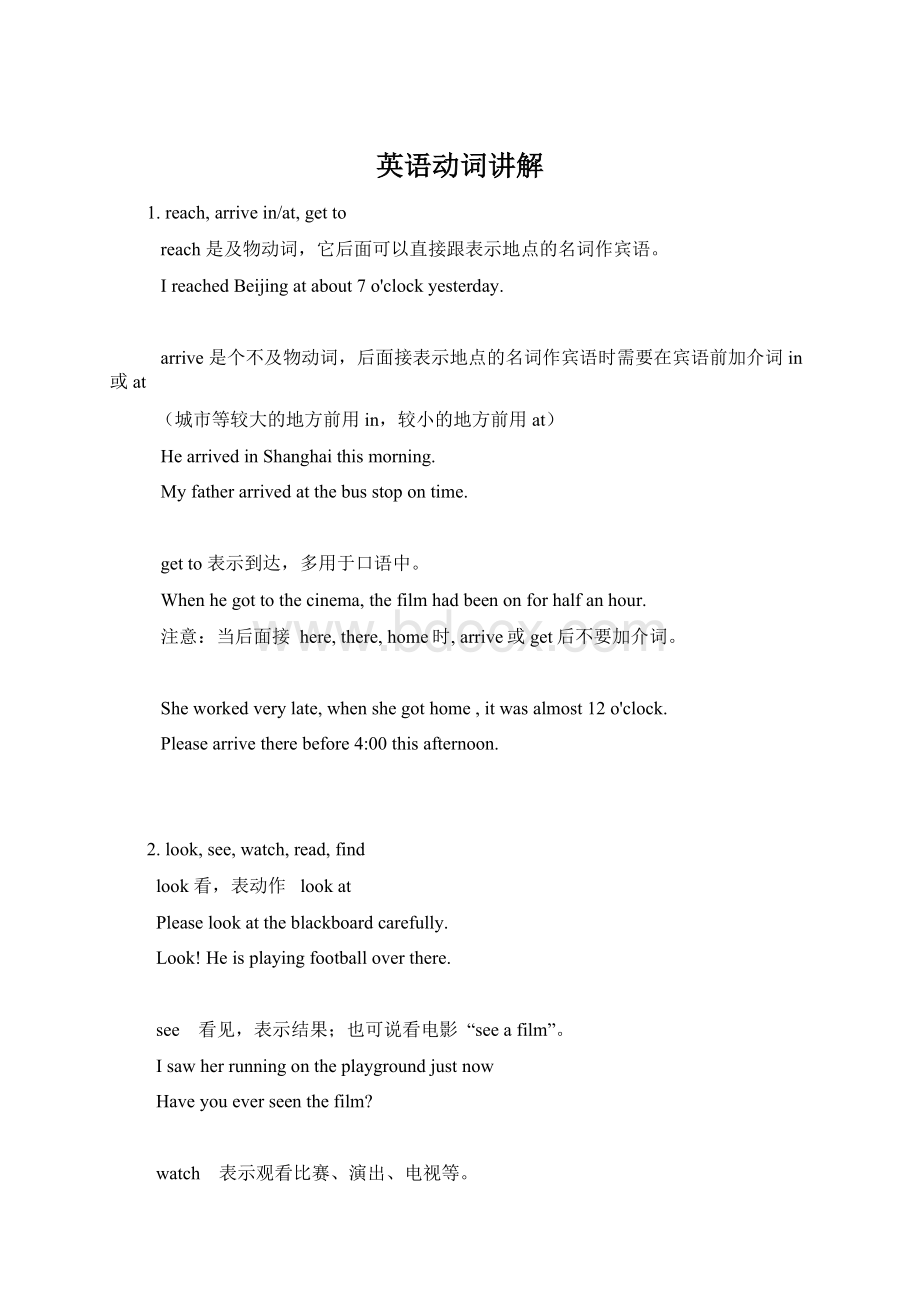英语动词讲解.docx
《英语动词讲解.docx》由会员分享,可在线阅读,更多相关《英语动词讲解.docx(13页珍藏版)》请在冰豆网上搜索。

英语动词讲解
1.reach,arrivein/at,getto
reach是及物动词,它后面可以直接跟表示地点的名词作宾语。
IreachedBeijingatabout7o'clockyesterday.
arrive是个不及物动词,后面接表示地点的名词作宾语时需要在宾语前加介词in或at
(城市等较大的地方前用in,较小的地方前用at)
HearrivedinShanghaithismorning.
Myfatherarrivedatthebusstopontime.
getto表示到达,多用于口语中。
Whenhegottothecinema,thefilmhadbeenonforhalfanhour.
注意:
当后面接 here,there,home时,arrive或get后不要加介词。
Sheworkedverylate,whenshegothome,itwasalmost12o'clock.
Pleasearrivetherebefore4:
00thisafternoon.
2.look,see,watch,read,find
look看,表动作 lookat
Pleaselookattheblackboardcarefully.
Look!
Heisplayingfootballoverthere.
see 看见,表示结果;也可说看电影 “seeafilm”。
Isawherrunningontheplaygroundjustnow
Haveyoueverseenthefilm?
watch 表示观看比赛、演出、电视等。
HelikeswatchingTV.
Didyouwatchthefootballgameyesterday?
read 表示看书,看报等
Helikesreadingbooks
几个与“看”有关的词或者词组:
lookfor,find,findout,lookafter,takecareof,look
over, lookforwardto.
lookfor 寻找,表过程;find 发现,找到 期findout找出,查明。
Ilookedformybookeverywhere,butIcouldn'tfinditanywhere.
lookafter,takecareof均表示"照看,照顾".
Sheoftenlooksafter/takescareofhersisterathome.
lookover 检查身体等
Thedoctorlookedoverthepatientverycarefully.
lookforwardto盼望……,期待……,后面接名词、代词或动名词形式。
Iamlookingforwardtomeetingyouagain.
3.spend,take,pay,cost
spend多用人作主语,后接金钱或时间。
spend…onsth/(in)doingsth,in可以省略。
同义句是
Ittakessbsometimetodosth
Meimeispenttwohours(in)doingherhomework.
Hespent50yuanonthisnewbook.
take常用于"Ittakessbsometimetodosth"句型中。
Itoftentakeshimanhourtogotoschoolbybike
Ittookmeaweektofinishthework.
说明:
take...todosth.句型侧重完成该动作花费的时间,而spend...doingsth.有时并不说明动作
是否完成。
如:
Ittookhimanhourtoreadthebook.他用一小时读完了这本书。
Hespentanhour(in)readingthebook.他用了一小时读这本书。
(是否读完并未说明)
pay的基本意思是"支付",作为及物动词,宾语可以是"人"和"钱"。
如:
Hepaidthetaxiandhurriedtothestation.他付了出租车的钱,急忙向车站赶去。
We'llpayyouinafewdays.几天后我们会给你钱。
pay常与for连用,表示"付款"。
HowmuchshouldIpayforthebooks?
Youmustpayforthebookifyouloseit.
cost常用物作主语,表示“价值或花费多少钱”。
Thiscomputergamecostsme30yuan.
Howmuchdotheycost?
4.puton,wear,dress,dressup,in
puton指“穿上,戴上”的意思,强调动作,代词多放在中间。
Hereisyourhat.Putiton,Lucy.
Heputonhisnewpairofsunglassesandwentout.
wear指“穿着,戴着”,表示状态。
Sheiswearingawhiteblouseandaredskirt.
dress指“给某人穿衣服”,其宾语多是人。
Thechildcandresshimself.
MrsKingdressesherchildeveryday.
dressup指“穿上盛装,打扮。
”
Themeetingisn'tveryimportant;youneedn'tdressupforit.
in是个介词,后多接衣服的颜色,表示“穿着……颜色衣服的”。
Themaninblackismyfather.
5.mend,repair
mend通常指对器具的简单修理,缝补衣服、鞋袜或者修理破损的东西。
I'llmendtheshirt.
repair指把损坏的、发生故障的东西修好,通常需要一定专门技术、较复杂的设备,是难度较大的修理。
MrGreensentforanelectriciantorepairthestove.
6.bring,take,get,carry
bring指将某物或某人从离说话人较远处“拿来”或“带来”。
Pleasebringyourdictionarytoschooltomorrow.
take指将某物或某人从离说话人较近处“带到”或“拿到”离说话人较远处。
Itisrainingnow.Youhadbettertakeanumbrellawithyouwhenyougoout.
carry不强调动作来去的方向,只说明动作方式,表示“背着、扛着、提着、搬运、载着”等含义。
Thebusesandtaxisarecarryingpeoplehereandthere.
IamsostrongthatIcancarrytheheavybox.
get指从说话人所在位置到别处把某物拿来。
Canyougettheballforus?
7.usedto,beusedto
usedto+动词原形,表示过去常常。
Whenhewasyoung,heusedtogoswimminginwinter.
beusedto+动词ing,表示现在常常。
Iamusedtoplayingfootballafterclass.
8.say,speak,talk,tell
say接说话的内容,作及物动词。
saysthtosb对某人说某事。
Whatdidyousaytomymother?
CanyousayitinEnglish?
speak常指能说某种语言,打电话时表示说话,也有“演讲”的意思,不强调说话的内容。
DoyouspeakEnglish?
MrJohnsonwillspeakatthemeeting.
talk常作不及物动词。
表示“交谈,谈论”;做名词时有“演讲,报告”的意思。
Whataretheytalkingabout?
Iwilltalktoyourfatheraboutyourhealthnexttime.
MrZhangisgoingtogiveusatalkatthemeeting.
tell的意思是“告诉某人……;讲述……;吩咐某人做……”。
多为及物动词,后面多接双宾语。
IwilltellTomthenewsassoonashecomesbacktomorrow.
Mymotheroftentellsmeinterestingstories.
9.listen(to),hear,hearof,hearfrom
listen听,后面不跟名词 listento听……,后面一定要加名词。
表示听的动作。
Listen!
Thebirdsaresinginginthetree.
Iamlisteningtotheradio.
hear
(1)听见,听到
(2)听说,后面一般加句子。
如果后面是名词,刚用hearof
Canyouhearmeclearly?
(听见)
IheardhersingingasongwhenIpassedherroom.(听到)
Iheardthatfamoussingingwouldcomeherenextweek.(听说)
hearof听说……,后面跟名词或者代词
Haveyouheardofthatfamoussinger?
hearfrom=receive/getaletterfromsb=receive/getone'sletter收到某人的信息或来信。
Iheardfrommyfatheryesterday.
=Ireceived/gotaletterfrommyfatheryesterday.
=Ireceived/gotmyfather'sletteryesterday.
10.borrow,lend,keep
borrow表示从别处或别人那里“借来”东西,常与from连用。
CanIborrowyourbike?
=Canyoulendmeyourbike?
Ioftenborrowbooksfromourschoollibrary.
lend表示将东西“借出、借给”别人,常与连用。
Canyoulendmeyourbike=CanIborrowyourbike?
Don'tlendmybooktoothers,please.
keep表示“借、保存”,是延续性动词,要与表示一段时间的时间状语连用。
Heborrowedthebookamonthago.Hehaskeptitforamonth.
HowlongcanIkeepthebook?
11.rise,raise
rise是不及物动词,后面不跟名词。
表示“上升、提高、增长”等。
Thepricesofallkindsofgoodsarerisingveryquickly.
Everyoneknowsthatthesunrisesintheeast.
raise是及物动词,后面要跟名词。
表示“举起、抬起”。
Heraisedhishandtoasktheteachertolethimanswerthequestion.
12.begin,start
begin较常用,指开始某一动作或进程,与end相对。
而start着重于开始或着手做,有较强的动作性,
带有突然开始的意思,与stop相对
Thefirstclassbeginsat7:
30everymorning.
Themeetingwillbeginat9:
00tomorrowandendat5:
00pm.
Nowlet'sstarttorunasquicklyaswecan.
另外,当表示机器开动、创办或开设、出发或动身时要用不着start而不用begin。
Hestartedthemachineandbegantowork.
Theystartedasupermarketnearourbuilding.
IwillstartforHainansoon.
13.need,want
need和want均可表示“需要”,need可作情态动词而want不可作情态动词。
当作实义动词时两者
后面都可接名词、代词或动词不定式作宾语。
Iamverytired.Ineed/wantagoodrest.
Iwanttogotherewithyou.
Ineedtowritethewordsdownonthenotebook.
want后可接宾语补足语,而need不可以。
Hewantedmetohelphim.
当表示某人或某物需要被怎么样时,need和want后面要接动名词形式。
Mybikeisbroken.Itneeds/wantsrepairing.
Thewallsaretoodirty.Theywant/needcleaning.
14.learn,study
learn与study均可表示“学习”,有时可以互换。
但learn强调通过学习、练习或由别人教授而获得
某种知识或技能,侧重于学习的成果,表示“学会,学到”。
而study指要通过深入的研究、探讨、
或学习,它侧重于学习的过程,意思是“研究、探讨、钻研”。
Wearelearning/studyingEnglishatschoolnow.
IstudiedhardandatlastIlearnedtoplaythepiano.
learntodosth.多表示学会做某事;learndoingsth.多表示学习做某事。
当表示“向某人学习”
时只能用learn
Icomeheretolearnsinging.
Ihavelearnedtoswim.
Weoftenlearnfromeachotheratschool.
15.receiveaccept
receive的意思是“收到了……”,只表示收到某物,并不表明同意或不同意接受的含义。
Ireceivedagiftfromher,butI returneditbacktoherthismorning.
accept表示“接受……”,“同意接纳……”。
如接受物体、邀请、批评等。
Hereceivedaninvitationfromherandacceptedithappily.
16.answer,reply
answer意为“回答、响应、答复、接听电话”等,多作及物动词。
Canyouanswertheteacher'squestions?
Icalledyou,yourfatheransweredthetelephone.
reply意为“回答、答复”,是不及物动词,后需要加介词to,at等再加宾语。
Pleasereplytothesequestions.
17.hope,wish,expect
hope指主观上的愿望,在客观上也有实现的可能性,常接that从句,动词不定式或以for引出的短语,但不
可用不定式作宾语补足语。
IhopetobeadoctorwhenIgrowup.
Wehopeshewillbebettersoon.
Ihopeyoucomeheresoon.
wish表示“希望”、“愿望”、其希望基本上能实现。
后面可有名词、不定式作宾语或宾语补足语。
Wewishtohaveagoodtimetonight.
Herearebeautifulflowersforyou.Wishyouahappybirthday.
Iwishyoutogotherewithmetomorrow.
若后面接从句,则表示实现的可能性不大。
HowIwishthatIcouldflyoneday.
expect着重指客观上有可能实现的“期待、期望”等,其后可接名词、代词、动词不定式或that从句
Iamexpectingthatshewillbebettersoon.
Weareexpectingaletterfromhim.
18.lie,lay
lie位于 ShanghailiesintheeastofChina.
lie-lied-lied-lying(说谎) Weshouldn'tlietofriends.(说谎)
lie-lay-lain-lying(躺) Themanlayinthemiddleoftheroadjustnow.(躺)
lay-laid-laid-laying(放置、产卵) Thehenlaidtwoeggsyesterday.(产卵)
Supperisready,Laythetableforbreakfast.(放置)
lie可作名词,表示谎言。
tellsbalie
Hetoldmeabigliejustnow.
19.neither,none
neither否定两个人或者物,其反义词为both。
作主语时,谓语动词要用单数。
NeitherofthetwinsisinClassOne.
这一对双胞胎都不在1班
none否定三者或三者以上的人或物,其反义词为all。
它指不可数名词时,谓语动词用单数形式;指复
数名词时,有两种情况:
noneof+有生命体,谓语动词用复数;noneof+无生命体,谓语动词用单数。
Noneofthismoneyismine.
这笔钱没有一点是我的。
Noneofthebikesarenew.
这些单车都不新。
NoneofthestudentsarefromGuangdong.
这些学生没有一个来自广东。
20. night,evening
这两个词都有“傍晚”或“夜晚”的意思。
evening泛指晚上,一般表示从天黑或晚饭就寝这段时
间。
night指夜晚,表示从日落到日出这段时间。
atnight在夜晚
intheevening在晚上
inthenight一整夜(反义词是intheday=atnight+intheevening)
Goodevening!
晚上好(晚上见面时的问候语)
Goodnight!
晚安(临睡时的问候语)
21. no,not
这两个词都有否定的含义,很容易混淆。
注意他们在意思与用法上的差别:
no的意思是“没有”,相当于nota或notany;而not的意思是“不”。
Hehasnosisters=Hehasnotanysisters.
Noteverybodythinksso.不是人人都这么想。
名词前如果已经有a,any,much,enough等词时,要用not,而不用no。
no+形容词/副词比较级+than表示该形容词或副词的相反含义。
not+形容词/副词比较级+than只是表示比较结构的普通否定。
22.nomore,nolonger
nomore与not...anymore,not...anylonger同意,表示程度、